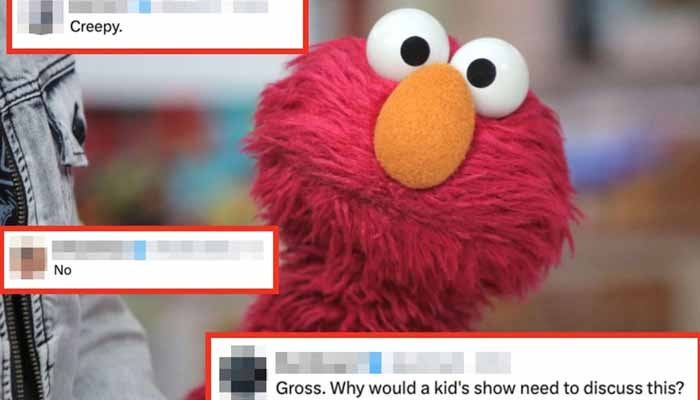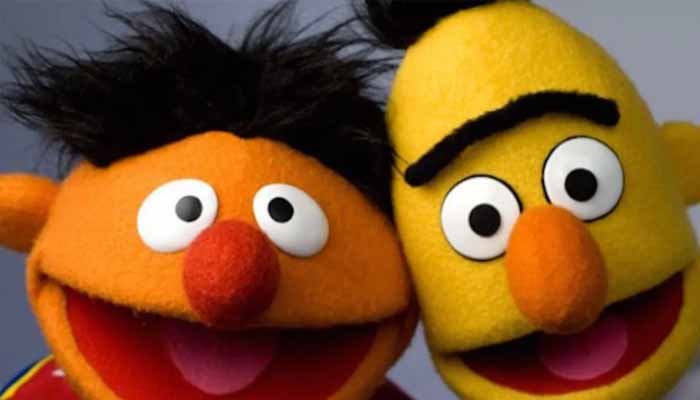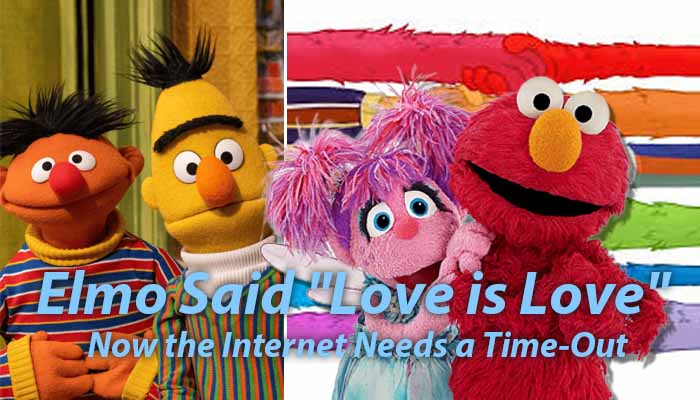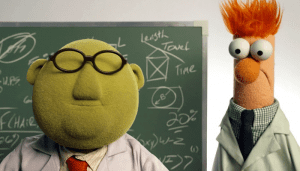Well, folks, it’s June again. The sun is (allegedly) shining, the birds are chirping, and corporations are slapping rainbows on everything from mouthwash to artisanal dog biscuits. And, like clockwork, the most terrifying, radical, and downright dangerous organization on the planet, Sesame Street, has once again decided to remind children that – clutch your pearls – being nice to people is a good thing. The horror!
The Rainbow Connection… to Outrage!

On June 1st, 2025, the official Sesame Street X (formerly Twitter) account dared to post the following incendiary message: “On our street, everyone is welcome. Together, let’s build a world where every person and family feels loved and respected for who they are. Happy #PrideMonth!”. This shocking declaration was accompanied by an image of colorful puppet arms linked together, clearly a nefarious symbol of… unity?.
Predictably, the internet, a place renowned for its calm and measured discourse, experienced what can only be described as “absolute meltdowns”. A “significant online backlash” erupted because, apparently, the idea of muppets advocating for love and respect is a bridge too far for some.
What makes this annual explosion of indignation even more chuckle-worthy is that this isn’t Sesame Street’s first trip to the Pride Month rodeo. This is an “annual message”. As one astute observer on Reddit pointed out, “This is the same pride message Sesame Street posted last year, maga has short memories for their meltdowns”. It seems the outrage isn’t so much a spontaneous reaction to a new, shocking development, but rather a cherished yearly tradition for a certain segment of the online population. The predictability of it all almost makes one want to set a calendar reminder: “June 1st: Prepare for Muppet-Induced Moral Panic.” This recurring pattern suggests the fury is less about the specific words Elmo and friends used this year and more about a deep-seated, perennial objection to a beloved children’s program acknowledging that LGBTQ+ people, you know, exist and deserve respect.
The Accusation Conga Line: What Did Elmo Do NOW?!
The responses to Sesame Street’s message of basic human decency were, shall we say, colorful. It was a veritable conga line of accusations, each more breathless than the last. One user, Viva Frei, dramatically declared, “THIS IS GROOMING. THIS IS CRIMINAL. THIS IS PERVERSION”. Another, Smash JT, chimed in with, “Kids aren’t gay. Kids aren’t sexual. This is disgusting indoctrination and Sesame Street staff/PR deserves all the backlash they get for it. Gross”. Not to be outdone, Michael Knowles opined that this was “…just a publicly funded puppet show promoting weird sex stuff to your three-year-old”.
And, of course, no online outrage about Pride Month would be complete without the timeless classic: “When is straight month?”. Some even felt the need to share instructions on “How to report this post”. The general sentiment was perhaps best summed up by a user who anticipated the “absolute sewage leak that would explode in the replies”.
To help navigate this linguistic battlefield, here’s a handy translation guide:
The Outrage Dictionary: Muppet Edition
| What They Screamed Into the Void | What Sesame Street Actually Said | Our Translation (Because Someone Needs To) |
|---|---|---|
| “THIS IS GROOMING. THIS IS CRIMINAL. THIS IS PERVERSION.” | “On our street, everyone is welcome.” | Apparently, “welcome” is now a gateway crime. |
| “Kids aren’t gay. Kids aren’t sexual. This is disgusting indoctrination.” | “Together, let’s build a world where every person and family feels loved and respected for who they are.” | Telling kids to respect all families is now a “disgusting” concept. Noted. |
| “…promoting weird sex stuff to your three-year-old.” | “Happy #PrideMonth!” | The only ones bringing “weird sex stuff” into this are the commenters. |
| “When is straight month?” | “On our street, everyone is welcome.” | Buddy, every month is straight month. Try turning on the TV. Or going outside. |
The immediate leap from a message about “love and respect” to accusations as severe as “grooming” and “perversion” is quite telling. It suggests that these critics aren’t actually responding to the text of Sesame Street’s message. Instead, they seem to be reacting to the mere context of Pride Month, armed with a pre-loaded narrative where any acknowledgment of LGBTQ+ individuals, especially in proximity to children, is automatically sinister. The arguments that “Kids aren’t gay. Kids aren’t sexual” and that Sesame Street is “promoting weird sex stuff” further reveal a peculiar projection. The show’s message is about families feeling “loved and respected” ; it’s the critics who seem determined to inject a sexual connotation into a simple statement of acceptance, a common rhetorical tactic used to discredit LGBTQ+ visibility.
Meanwhile, Bert and Ernie Are Just Trying to Enjoy Their Pigeon-Watching Hobby in Peace

What makes the current pearl-clutching particularly amusing is the long and storied history of two of Sesame Street’s most iconic residents: Bert and Ernie. As one X user astutely pointed out amidst the chaos, “Btw, these were the first gay icons I ever met, idk what these conservatives are mad about. #GayIconsBertAndErnie”. Another echoed this sentiment with a simple, “i mean bert and ernie HELLO?”.
This isn’t just wishful thinking from fans. Back in 2018, former Sesame Street writer Mark Saltzman mentioned in an interview that he often drew on his own long-term relationship with film editor Arnold Glassman when writing for the pair. Saltzman stated, “I always felt that without a huge agenda, when I was writing Bert & Ernie, they were. I didn’t have any other way to contextualize them”. While Sesame Workshop officially responded with a firm “No they’re not [gay],” and puppeteer Frank Oz offered what was described as a “tone-deaf defense” , the public perception has largely remained. For decades, a significant portion of the audience has seen Bert and Ernie as more than just roommates who happen to share a deep appreciation for pigeons and paperclips. The current uproar over a general Pride message seems blissfully unaware, or perhaps willfully ignorant, of this widely accepted “gay icon” status that has been part of the Sesame Street lore for years. It underscores how characters can develop a life and meaning in the public consciousness that sometimes runs parallel to, or even overtakes, official statements.
Hold Up, You Mean Sesame Street Has Always Been About… Gasp… Inclusion?!
The sheer audacity of getting angry at Sesame Street for promoting inclusivity is, to put it mildly, like getting mad at water for being wet. Their commitment to these values isn’t some new, “woke” trend; it’s literally woven into their felt DNA. As Sesame Workshop themselves state, “Our commitment to diversity, equity, and inclusion is in our DNA. Since the day we were founded, our mission has focused on meeting the educational needs of all children”. They even have an employee resource group called “123Proud!” which “centers LGBTQIA+ identities”.
Let’s take a quick trip down memory lane, shall we? Sesame Street first graced our airwaves in 1969. Its creation was a deliberate effort to bridge achievement gaps for children in underserved urban communities, directly combating societal racism. It was “one of the first television programs…to feature an urban setting and a culturally diverse cast” , a conscious choice to provide representation for city kids. This was so radical at the time that Mississippi actually banned the show in 1970 because of its integrated cast.
Throughout its 55 seasons , the show has never shied away from difficult topics. It has gently guided children through understanding death (the iconic Mr. Hooper episode), love, marriage, childbirth, the emotional aftermath of 9/11, natural disasters, HIV (with the groundbreaking Muppet Kami in the South African co-production Takalani Sesame), and autism (through the introduction of Julia). The entire endeavor was designed to “normalize cultural diversity, empathy for others, and a sense of community connectedness”.
The current outrage implies that Sesame Street has suddenly taken a sharp left turn into political correctness. However, a glance at its history shows it was founded on what were, and still are, progressive principles of inclusion and addressing social realities head-on. Those expressing shock are exhibiting a peculiar form of selective amnesia, conveniently forgetting the show’s five-decade legacy to fit a narrative of a beloved institution somehow “falling” from grace. It’s a classic case of the “good ol’ days” fallacy, where nostalgia paints a picture of a simpler, less “political” past that never truly existed. Many critics likely grew up with the show and feel a sense of ownership, but their rose-tinted memories may have edited out the consistently challenging and inclusive content that was always there. The show hasn’t changed its core values; the world, and perhaps the critics’ willingness to extend those values to everyone, has.
The Sanity Squad Assembles: “Read the Tweet, Karen!”

Amidst the digital gnashing of teeth, a chorus of supportive, common-sense, and often humorous voices emerged. Many users “defended the post, applauding Sesame Street for continuing to promote empathy and diversity”. Comments like, “Shoutout to sesame street for raising me to be empathetic and caring towards everyone” and “Sesame Street continues to be awesome” flooded the replies.
There was a palpable sense of incredulity from many. “People are mad at Sesame Street for… teaching kids to accept others?” one user asked, bewildered. Another praised the show’s steadfastness: “I love that Sesame Street stays unbothered and does a pride post every year…”. And perhaps most tellingly, “Good on sesame street for posting this knowing the absolute sewage leak that would explode in the replies”. Some even pointed out the delicious irony: “MAGA is angry because PBS produces actual children’s programming, unlike Daily Wire and PragerU which produce child indoctrination. Every projection is a confession”.
A particularly beautiful irony emerges from these supportive comments. Many who defended Sesame Street explicitly credited the show with teaching them the very values of empathy and acceptance it’s now being attacked for. The show’s mission has always been to foster these qualities. So, in essence, Sesame Street is being criticized for succeeding so spectacularly at its lifelong mission that generations of its viewers are now standing up to champion those exact principles. The backlash isn’t just against a Pride post; it’s against the enduring positive impact of early childhood education focused on prosocial values.
So, What’s the Letter of the Day? ‘A’ for ‘Absurdity’ (And Maybe ‘Acceptance’)
So, here we are in 2025, where a children’s show tweeting about love and respect can ignite a firestorm. Through it all, Sesame Street “remains firm in its stance” and “continues to stand by its message of welcoming all families and promoting love and respect for everyone”. They haven’t dignified the backlash with a direct response , perhaps because, as many have noted, they stay “unbothered”.
This “Unbothered Muppet Strategy” is, frankly, iconic. By refusing to legitimize the absurd accusations or get dragged into bad-faith arguments, they make a powerful statement. They simply continue their work, teaching kindness, acceptance, and how to count to ten – a skill some of their detractors might find useful.
The core message, “On our street, everyone is welcome,” is so profoundly simple and benign that the outrage it provokes is, well, absurd. It truly makes one wonder, as a user aptly put it, why people are “mad at Sesame Street for… teaching kids to accept others?”.
Perhaps the real monsters aren’t the ones made of felt, cheerfully singing about the alphabet and sharing. Maybe, just maybe, the truly scary figures are the ones furiously typing in all caps because a puppet suggested being kind. One can only hope they eventually learn to share their cookies, and maybe a little bit of that love and respect too. Until then, pass the popcorn. This annual meltdown is, if nothing else, reliably entertaining.




